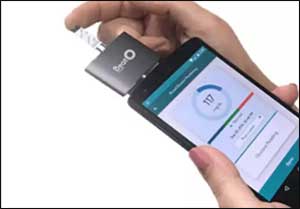- Home
- Editorial
- News
- Practice Guidelines
- Anesthesiology Guidelines
- Cancer Guidelines
- Cardiac Sciences Guidelines
- Critical Care Guidelines
- Dentistry Guidelines
- Dermatology Guidelines
- Diabetes and Endo Guidelines
- Diagnostics Guidelines
- ENT Guidelines
- Featured Practice Guidelines
- Gastroenterology Guidelines
- Geriatrics Guidelines
- Medicine Guidelines
- Nephrology Guidelines
- Neurosciences Guidelines
- Obs and Gynae Guidelines
- Ophthalmology Guidelines
- Orthopaedics Guidelines
- Paediatrics Guidelines
- Psychiatry Guidelines
- Pulmonology Guidelines
- Radiology Guidelines
- Surgery Guidelines
- Urology Guidelines
Diabetics shall be managing the disease with their smartphones shortly

Diabetics may soon be able to manage the disease with their smartphones, according to a study which shows that stimulating the body's electrical network can help treat the condition.
The research indicates that data available on a wide range of nerve stimulating procedures - from ancient traditional acupuncture and the more modern electroacupuncture to neuromodulation, a procedure that involves implanting electrical devices to relieve chronic pain, pelvic disorders - can be advantageous for treating inflammatory disorders like arthritis and deadly infections like sepsis.
In the study, published in the journal Trends in Molecular Medicine, researchers said nerve stimulation provides therapeutic benefits in treating colitis, diabetes, obesity, pancreatitis, paralysis, and life-threatening infections.
"Our bodies are a lot like rooms in a house. In order to see when you enter a darkened room, you need electricity to turn on the lights," said Luis Ulloa, from the Rutgers University in the US.
"Our body is like that room and has an electrical network that can be used to manipulate and help control how it works," Ulloa said.
Bioelectronic medicine, a new and more advanced version of electroacupuncture, is aiming to treat chronic diseases with electrical signals in the body by using miniature implantable devices to make sure organs function properly.
"All you have to do is look at the pacemaker and how it has enabled people with arrhythmias to live long lives," Ulloa said.
"We believe this type of medicine could be used throughout the body," he said.
According to Ulloa, scientists need to do compare the data from all these nerve-stimulating procedures to the recent studies done in experimental and animal models.
This means recognizing the clinical advantages of varying procedures including acupuncture.
"In the future, I believe we will be connected to the cell phone in order to control our organ functions," he added.

Disclaimer: This site is primarily intended for healthcare professionals. Any content/information on this website does not replace the advice of medical and/or health professionals and should not be construed as medical/diagnostic advice/endorsement or prescription. Use of this site is subject to our terms of use, privacy policy, advertisement policy. © 2020 Minerva Medical Treatment Pvt Ltd